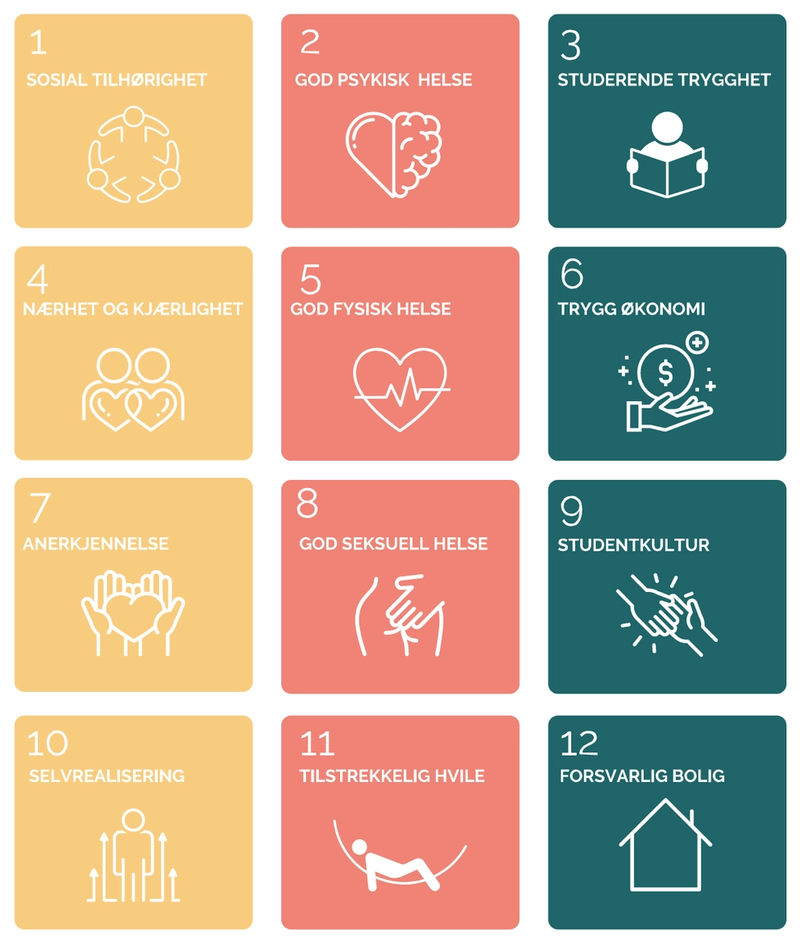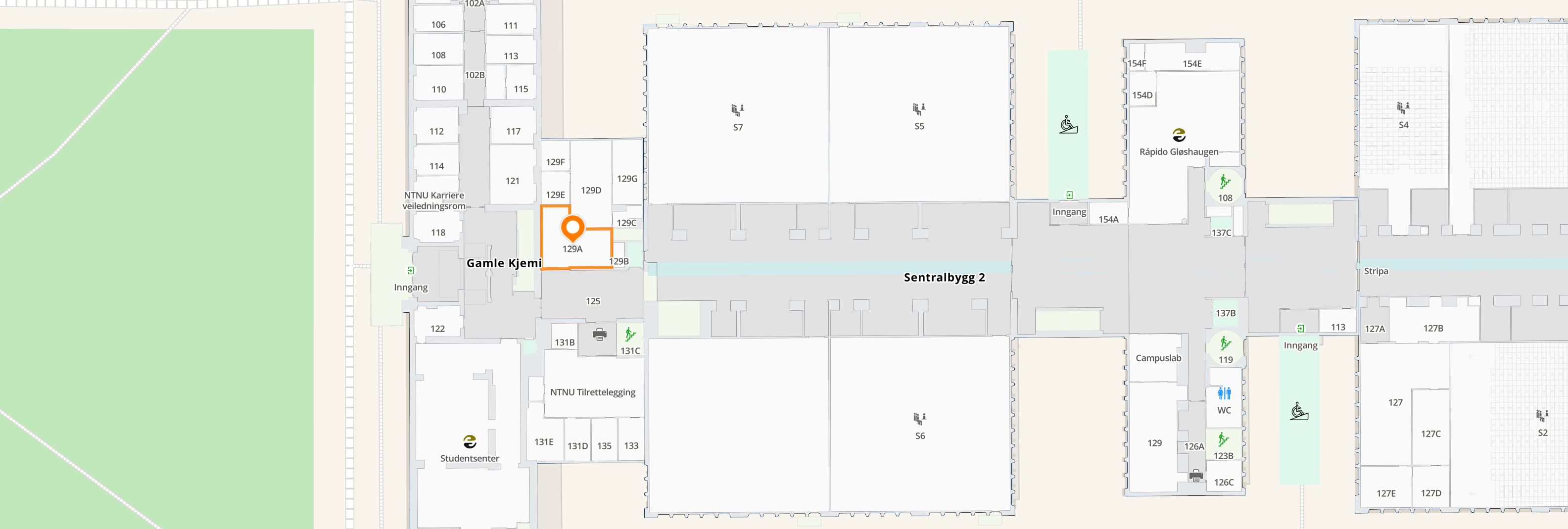Student sustainability goals
For a meaningful student life - The main goal of the model is to provide a comprehensive understanding of what is important for the student to achieve the highest possible welfare and quality of life, what is achievable through the student's own resources, and it addresses factors that are important for creating as meaningful a student life as possible. It refers to the idea that everything in life is interconnected and has an impact on other areas of life. By being aware of this, one can map out how to tailor the study period to be something suitable for the individual.
Bærekraftsmålene
is about:
being part of a larger community
being able to give and receive something valuable from something bigger
getting new impulses from other people
having something to spend one's free time on
Having a social belonging provides the opportunity to experience being a student and not just studying. Social belonging can arise through various arenas, such as through organizations like student associations, friend groups, sports teams, interest groups, studies, positions, and collective living. Another form of belonging is feeling that one has a place in the city where they study. This involves knowing about offerings, activities, and other available resources, and feeling a sense of belonging to the educational institution and the program of study.
is about:
having an open and safe dialogue about the challenges one experiences
not wearing oneself out to perform
being aware of one's own signals and symptoms, and what one needs to feel well
It is not uncommon for life to have its ups and downs, and the student years are far from an exception. Therefore, it is all the more important to have an open dialogue about finding life difficult, breaking the taboo and shame surrounding experiencing mental difficulties or challenges, and acknowledging that it can be demanding to be a student at times.
Students often push themselves unnecessarily hard because it feels like the norm is to handle everything - all the time. This is an unrealistic way of life; life has its ups and downs, and pushing oneself too hard will take a toll on both physical and mental well-being. It is therefore important to take one's own and others' mental health seriously, be aware of one's own energy levels, the signals the body sends, and the symptoms that arise when pushing one's own limits.
Students should have good access to sufficient information about opportunities for conversation and help, as well as information about influencing factors that can affect mental health, such as diet, sleep, and living environment.
is about:
feeling secure in one's study situation
having the opportunity to unfold and develop, and having good facilitation for learning opportunities
a lower threshold for discussing challenges related to studying
receiving good and helpful guidance on the study program and academic path
Studying is not merely about producing credits with the goal of obtaining an education as quickly as possible, where knowledge consists of merely passing exams without truly digesting what one learns.
Having good navigation, guidance, and assistance from the educational institution is crucial for success, both for the student and the institution. The more students feel taken care of and receive the help they need, the fewer will drop out of the program due to dissatisfaction.
Educational institutions should contribute to shaping the student in various aspects of life, not just professionally. Therefore, it is important to consider the entirety of the student and their academic life, not just what happens in lectures or exam papers.
are about:
having natural primary close contacts, and good relationships with people who provide security and care
having good communication about what one needs and what one can do for others
showing oneself self-care and love
All people need someone they can have a more meaningful relationship with, someone they can be open, honest, and vulnerable with, and whom they can turn to when life gets tough, and who listens to the challenges they express. It's about daring to ask for support when needed and having that need met.
It must also be acknowledged that closeness and love are not only about our relationship with other people but also about the relationship we have with ourselves, where self-love and self-care are fundamental. This is about getting to know oneself better and understanding what one needs and how it's possible to achieve it, and how to best give oneself what one needs.
is about:
having knowledge about one's own body and what it needs to function as desired
having access to opportunities to move indoors and outdoors
having the possibility to prioritize one's physical health without it coming at the expense of anything else
It's about having access to exercise and activity options to maintain a level of movement that suits you, and the opportunity to participate in these activities. It's important to focus on the fact that exercise and physical health can encompass many things, and what defines good physical health is a level of functioning that you personally feel is good, and feeling satisfied with the goals you set for your own exercise, functioning, and body ideals.
It also involves the possibility of being free from bodily pains and gaining a better understanding of what in life can influence physical pain.
involve:
having finances for a reasonable standard of living that cover more than basic needs
not having to rely on extra income, loans, or savings
having student employment opportunities that are compatible with being a full-time student
The time as a student is financially demanding, where the student has limited funds, income, and opportunities to improve their financial situation.
Therefore, the grants and loans that students receive must cover more than basic needs such as food and shelter, as is also required for social support in society. The financial support should encompass the ability to participate in activities and student culture, and enable financial independence from parents and other forms of loans.
It should not be a prerequisite for students to dip into their savings, or to have to work alongside full-time studies to make ends meet.
involves:
being seen, heard, understood, and taken seriously
being understood as an individual
the students' voices being utilized and listened to by the educational institution
being open to others' perspectives and one's own perceptions of them
Being recognized as a student in an academic setting is important for the student's place in society, but it is also crucial to remove connotations from the word 'student' when it comes to general descriptions, as it involves hundreds of thousands of individuals on par with those in the workforce. It is important to have a broader focus on the individual that better represents what one wishes to promote.
involves:
awareness of one's own body, orientation, gender, boundaries, desires, and needs
having good communication about setting boundaries and consent, and how to respond to it
discussion about contraception and prevention of sexually transmitted infections
It is important to be aware of what good sexual health is and what the concept entails both on a general and personal level.
Having good knowledge about what good sex is and can be, how to have a satisfying sexual experience alone and with a partner, about having conversations with sexual partners, how the body functions, about the diseases one can contract, and which contraceptive methods are appropriate to use.
There should be a low threshold for asking questions, being open within the field, and being able to share experiences. There should be a greater normalization of not being sexually active or not wanting to be sexually active during the student years, and that this is a choice on par with being sexually active.
involves:
being part of a larger community that is social and fosters engagement
activities that are open for everyone to participate in or that offer opportunities for volunteerism
feeling that one has a place where they can engage in activities outside of their studies
Student culture should be a space that is open to all and is in a dynamic process that follows the students, rather than students having to adapt to the culture. It is a place where there is variation and room for both traditions and innovation, so that there is continuity in what works well and change in what is needed to create the best possible culture and environment.
All students should have the opportunity to participate in the cultural activities happening in their student community and campus, such as events open to all students, easily accessible gatherings, or other forms of solidarity, including roles and voluntary work, orientation weeks, student associations, student politics, and social, academic, religious, sports, political, and other interest organizations. There should be readily available information about cultural offerings and how to participate in them.
Every student has the right to feel that there is a place for them and to have the opportunity to engage in activities outside of their studies if they wish.
involves:
gaining an understanding of and the opportunity to develop oneself and become acquainted with one's resources
receiving inner motivation and a sense of mastery from what one engages in
giving oneself permission to fail and learn new ways of doing things
For self-realization to occur in a safe and comfortable manner, it needs to happen in secure environments where one feels successful and significant to oneself and others, and where there is the opportunity to be vulnerable but also to receive constructive feedback on one's contributions.
Having a network that believes in what you do and provides desirable support and guidance, and encourages trying things that may feel uncomfortable, can make this process easier.
It is also important to emphasize that self-development and self-realization also involve being important to someone else, and feeling that one contributes positively to something or someone.
involves:
giving oneself space to relax, unwind, and take breaks
engaging in recreational activities that provide relaxation from daily life
maintaining good sleep and rest hygiene as a foundation for optimal functioning
Having adequate rest is essential for maintaining a good quality of life, including for students. It's important to be able to tune in to oneself and know when one needs time to unwind, and to take the time to relax and recharge. Establishing healthy break habits and clear expectations regarding workload will contribute to a healthy culture of rest and can help prevent burnout.
Normalizing the idea that not everything has to be one's best effort will also contribute to a good culture of rest, which in turn will have ripple effects such as improved mental health, work motivation, and a more active social life if desired.
Additionally, there needs to be an effort to challenge assumptions that good and successful students are created by working late into the night, based on the notion that a good student is one who pushes themselves the hardest.
involves:
having a safe and comfortable home that suits the needs of the resident
having health-promoting and aesthetically pleasing spaces, and a good living environment where one wants to be
a place that is not overly expensive or inconvenient for a student to live in
All students have the right to have a home that feels safe, comfortable, and provides the opportunity to relax and have a private life they are comfortable with, in addition to being able to reflect their personal style and needs.
It means having housing that meets students' financial capabilities, and having a reasonable limit on how much rent can be charged. All students have the right to not be exploited in the housing market with excessively high rents, poor living conditions, and ensuring that the housing meets the general requirements for safe rental properties. There should be agreements and contracts that are safe and understandable for the student, and that do not favor the landlord if any issues arise.

